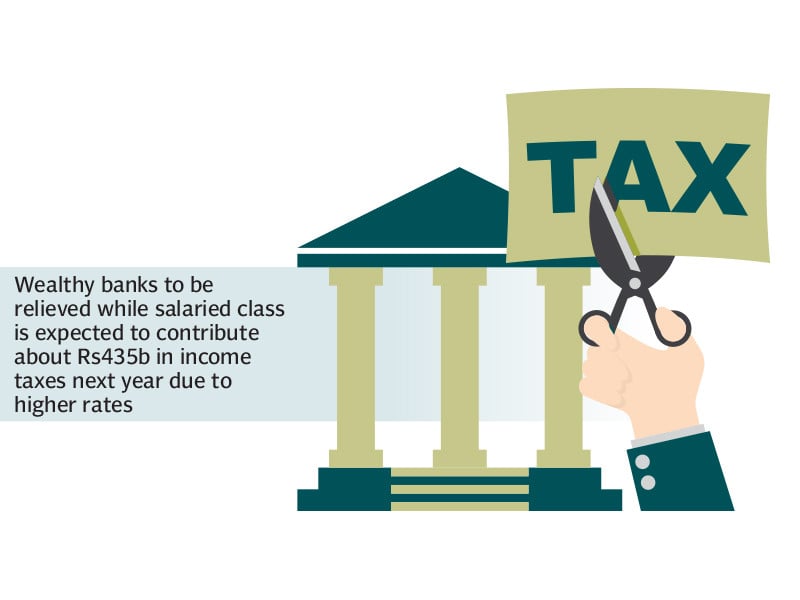ISLAMABAD:
Despite severe economic challenges, the government may abolish up to a 15% additional income tax on the profits that banks make by extending loans to the cash-strapped finance ministry. This move could provide approximately Rs60 billion in benefits to a sector that earned Rs960 billion in profits last year.
Senior government officials and banking industry sources informed The Express Tribune that an understanding has been reached between commercial banks and the federal government to abolish the Advances-to-Deposit rate-based income tax. These legal changes are likely to be made in the Income Tax Ordinance through the Finance Act 2024.
Finance Minister Muhammad Aurangzeb, a former banker, will present the Finance Act in the National Assembly on Friday for approval.
It is unusual for the government to provide around Rs60 billion in relief to one of the wealthiest sectors, particularly when it has imposed taxes on nearly every consumable good, increasing the tax burden on the poor and middle-income groups. About 27 banks made Rs960 billion in net profit in 2023.
While the government plans to abolish the tax on banks, it is not ready to reverse the significant tax increase for the salaried class, which is now expected to contribute about Rs435 billion in income tax next year due to higher rates.
Sources revealed that military authorities also requested the finance minister to review the proposed tax increase for the salaried class and to reconsider the flat 15% capital gains tax on property sales.
Initially, the Federal Board of Revenue (FBR) proposed tightening the additional income tax law for banks to close a loophole that banks used to avoid the tax. The additional income tax was introduced in 2022 to encourage banks to lend to the industry instead of making safe loans to the government.
Banks often avoid the levy by readjusting their lending to the government just before the December 31 tax payment deadline. The FBR proposed calculating the tax liability based on average annual lending to the government rather than on the last day of the year. This change would have allowed the government to collect an additional Rs60 billion next year.
However, instead of closing the loophole, the government plans to completely abolish the income tax.
Sources indicated that as part of an understanding reached between the banks and FBR, banks would pay advance income tax for the first quarter of the next fiscal year before June 30. They will also pay the super tax for 2023 and 2024. In return, the government has agreed to abolish the additional tax.
However, the advance income tax, the super tax and the ADR additional income tax of up to 15% are three distinct taxes and any advance or full payment cannot be an alternative to the 15% tax.
In the 2023 tax year, banks made a gross profit of Rs1.6 trillion and paid Rs960 billion in income tax.
Under pressure from banks, the government suspended the additional tax for 2023, but it became effective again in January 2024. The normal income tax rate for banks is 39%. However, if a bank’s gross Advances-to-Deposit Ratio (ADR) is up to 40%, the government charges a 55% income tax on investments in government debt. For ADRs of 40-50%, the rate is 49%, and if the ADR exceeds 50%, the normal rate of 39% applies.
In June 2022, the FBR estimated an annual revenue of Rs25 billion from the additional tax, despite lower rates at that time.
The banks’ current average ADR is near 42%, which would result in a 10% income tax.
The banking sector has criticised the ADR tax as unjust, arguing that it does not force the government to borrow. For the next fiscal year, the government plans to borrow Rs24 trillion from banks to service existing debt.
Following the International Monetary Fund’s ban on direct borrowing from the State Bank of Pakistan, the finance ministry now borrows the same amount through the banking sector, resulting in an average 1.5% higher interest rate than what would have been paid to the central bank.
In a letter to the FBR, Pakistan Banks Association (PBA) Secretary General Muneer Kamal stated that up to 84% of bank balance sheets are invested in government debt. The PBA argued that the ADR should not be used as a tax measure and should remain within the SBP’s purview.
The PBA asserted that the ADR tax was merely a revenue collection measure, and the 2022 data showed it did not result in a sustainable increase in banking sector advances. For the next fiscal year, the government has set a Rs12.97 trillion tax collection target, requiring an unprecedented 40% growth within a year.





